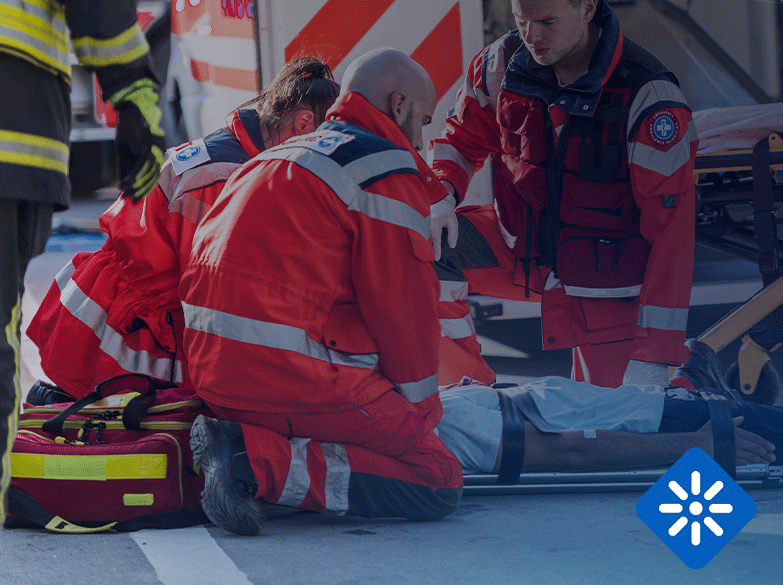Integrated workflows ease staff burden and satisfy regulatory mandates.
NJ Township Equips EMS with DrFirst’s Backline for Faster, Safer Treatment

Backline gives EMS access to patient medication histories and secure communications with hospital
ROCKVILLE, MD., August 25, 2020— Rapid access to medical care often means the difference between life and death when a patient suffers a heart attack, stroke, or other major trauma. To help speed treatment times in emergencies and protect patients from adverse drug events, Neptune Township in New Jersey is equipping its Emergency Medical Services (EMS) with in-the-field access to DrFirst’s Backline for secure messaging and medication history. Neptune is collaborating with the emergency department at Hackensack Meridian Jersey Shore University Medical Center to help the hospital prepare for incoming emergency patients. The academic medical center’s emergency department is the first in the state to receive information from an EMS service via Backline.
DrFirst is a healthcare technology pioneer whose award-winning Backline care collaboration platform provides secure communications that include telehealth, messages, and e-prescribing. With Backline, the Township’s paramedics and emergency medical technicians (EMTs) will have real-time access to patients’ medication histories through DrFirst’s robust MedHx solution, and they can send secure messages to Jersey Shore University Medical Center so the emergency room can prepare for incoming patients.
“Using Backline helps our patients in two critical ways. First, it gives our emergency responders access to their medication history to help avoid dangerous adverse drug events, even if a patient is too ill to communicate or doesn’t remember the information. And second, it allows us to share information with the hospital so doctors can be ready to take care of patients who need immediate care,” said Bil Rosen, EMS manager for the Neptune Township EMS.
Rosen noted that Backline is also helping patients who may have the novel coronavirus. “We started looking into Backline before the pandemic, and it’s extremely beneficial to have it in place now so we can alert the hospital if we are bringing in a patient who may need to be isolated because of suspected COVID-19. The very first time we used Backline, we were able to alert the hospital that we were on our way with a stroke patient and share information about the patient so the hospital could start treatment immediately,” he added. “We look forward to maximizing how we are using Backline, including activating more of its abilities for comprehensive care collaboration. Overall, we believe we are establishing a best practice for EMS-hospital communications and emergency care.”
Paramedics and EMTs can use Backline to scan barcodes on the back of patients’ driver’s licenses to confirm their identities and access medication histories for the last six months. Having this information reduces the risk of adverse medication reactions, especially for patients who are unconscious or unable to recall details of their prescribed meds. Neptune Township’s paramedics and EMTs can then securely transmit patient information when they are on the way to the hospital, including a photo of the insurance card when available, to help clinicians start treatment sooner.
Both the Neptune EMS System and Jersey Shore University Medical Center saw the value of this program and were committed to working together to implement it. “This is just another example of the long-term partnership between Jersey Shore University Medical Center and the Neptune Township Emergency Services in assuring the highest level of service to our community,” said Michael Bascom, Neptune Township emergency management coordinator.
Messages sent using Backline are secure, so they protect patients’ private health information, as required by the Health Insurance Portability and Accountability Act (HIPAA). In hectic emergency medical situations, there can be an increased risk of accidentally disclosing protected health information, which could result in millions of dollars in fines for breaches. Backline meets all HIPAA, HITECH Act, and Joint Commission requirements, protecting both patients and healthcare organizations and easing collaboration among care team members.
“Patient care can require a complex series of communications among team members, especially in emergency care,” said G. Cameron Deemer, DrFirst president. “Neptune Township EMS, in collaboration with Jersey Shore University Medical Center, represents the future of health care, using ground-breaking mobile technology to get critically needed medication information about their patients and to speed time to care when every moment counts.”
About DrFirst
Since 2000, DrFirst has pioneered healthcare technology solutions and consulting services that securely connect people at touchpoints of care to improve patient outcomes. We create unconventional solutions that solve care collaboration, medication management, price transparency, and adherence challenges faced in healthcare. We unite the Healthiverse—the interconnected healthcare universe—by providing our clients with real-time access to the information they need, exactly when and how they need it, so patients get the best care possible. DrFirst solutions are used by nearly 300,000 healthcare professionals, including more than 100,000 prescribers, nearly half of the EHRs in the U.S., and more than 1,400 hospitals in the U.S. and Canada. To learn more, visit DrFirst.com or follow @DrFirst.
Media Contacts:
DrFirst:
Alessandra Nagy, alessandra@bospar.com

